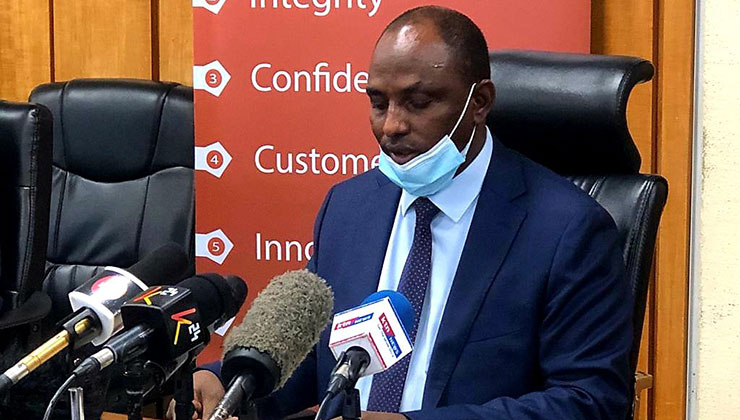National Treasury Cabinet Secretary Ukur Yatani now claims the country’s public debt remains sustainable at the current level estimated at Sh6.2 trillion, which is 58 percent of the Gross Domestic Product (GDP).
According to CS Yatani, Kenya’s public debt remains below the International Monetary Fund (IMF) and the World Bank debt sustainability assessment (DSA) threshold of 74 percent of GDP.
Appearing before the Senate Ad-Hoc Committee on COVID 19 pandemic via Zoom, Yatani told senators that Kenya continues to meet its debt obligations as they fall due and has not at any time defaulted on its obligations.
“Prior to the coronavirus pandemic, the government had already introduced measures to contain public debt at sustainable levels,” he said.
Austerity measures
The actions include taking decisive actions to curtail spending through austerity measures in order to reduce the size of the fiscal deficit.
“In this regard, the government has been pursuing a fiscal consolidation plan which aims at lower fiscal deficit from a high of 8.9 percent in 2016/17 financial year to 3.5 percent by 2022/23 financial year,” the CS told the Nairobi Senator Johnson Sakaja led committee.
The committee had invited the CS to shed light on the government plans on payment of public debt because of the expected shortfalls in revenue collections in 2019/20 and beyond.
Debt reforms
In his explanation, Yatani said Treasury is planning to reduce, to the extent possible, commercial borrowing by gradually shifting to concessional loans.
This will be by implementing domestic debt reforms to lower cost and risk of domestic borrowing by shifting away from Treasury bills to Treasury bonds.
In addition to re-allocating non-disbursing external loans (dormant loans) to priority projects.
“The coronavirus pandemic may delay the realization of our objectives but the measures we have already commenced implementing will make it easier for us to go through this crisis,” the CS noted.
Other measures that Treasury has put in the pipeline also includes stagger contracting of the current external loans in over the two financial years in 2019/20 and 2020/21 financial year and refinancing high-cost external debt estimated at US dollar 3 billion including negotiating with key creditors (Exim-Bank of China) to restructure on bi-lateral basis specific debts.
Treasury will also negotiate on bilateral basis swapping of debt service for grants financing key development projects – Big Four Agenda 4 and Climate Change.
Space for extra borrowing
On the same note, Treasury has moved to allay fears of a financial crunch amid the COVID-19 pandemic, saying the government still has space for additional government borrowing.
During this period of the pandemic, the Treasury has engaged various multilateral and bilateral partners on funding the interventions to fight Covid-19.
“These negotiations are bearing fruit. We have received Ksh.5.0 billion from the World Bank,” he said adding that they were engaging all donors (bilateral partners), the International Monetary Fund and also World Bank for emergency support.
“We, therefore, have space to still borrow from the domestic money market as well as our development partners to bridge the shortfalls that we have noted in the revenues,” he held.
Economic slowdown
However, the CS said the COVID-19 pandemic has caused an unprecedented economic and health crisis globally.
Further, the measures necessary to contain the virus have also triggered a social-economic downturn and there is still great uncertainty about its severity and length.
“The latest IMF Global Financial Stability Report shows that the financial system has already felt a dramatic impact, and further intensification of the crisis could affect global financial stability,” he observed.
As a result of the adverse effects of Covid-19 Pandemic, the IMF in its April 2020 report downgraded the global growth for 2020 to -3.0 per cent down from the 3.3 per cent projection in January 2020










